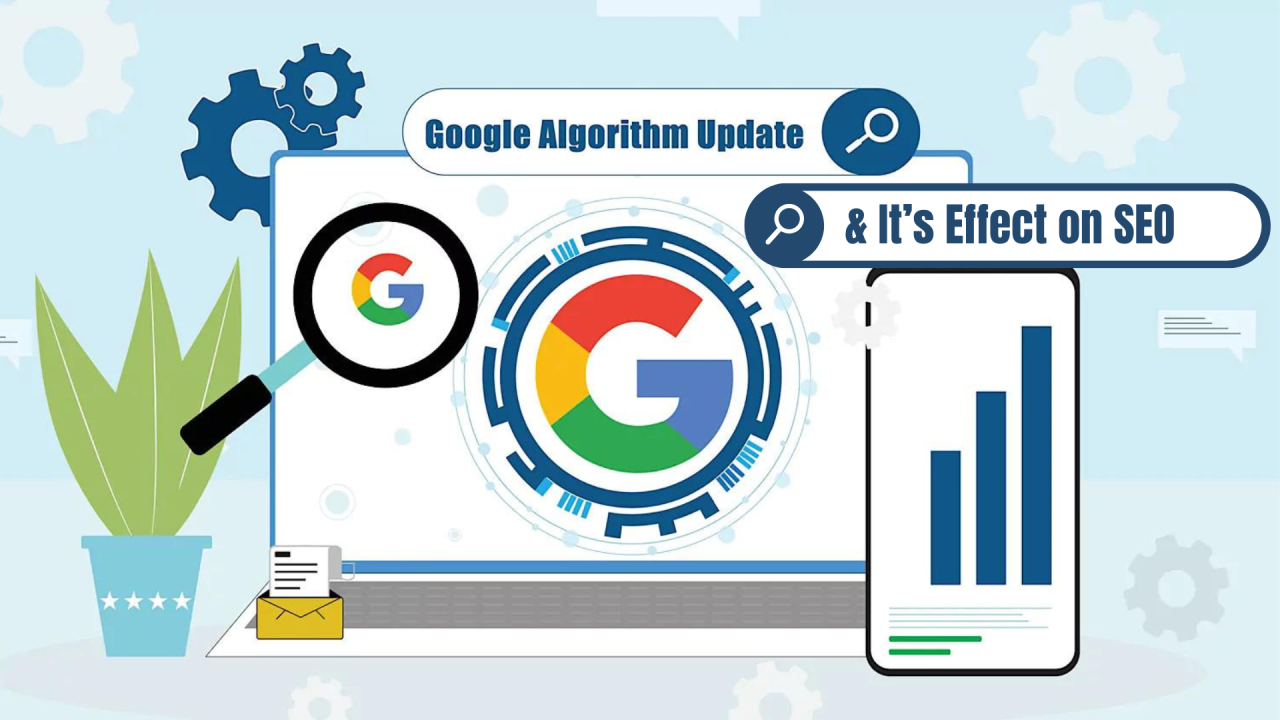Introducttion

Google constantly updates its algorithm to improve search results, enhance user experience, and combat spam. Every update influences rankings, making it essential for businesses and SEO professionals to stay informed. Whether it’s core updates, helpful content updates, or AI-driven advancements, understanding these changes can give you an edge in organic search visibility.
In this guide, we’ll break down the latest Google algorithm updates, their impact on rankings, and how you can stay ahead in SEO. From E-E-A-T (Experience, Expertise, Authoritativeness, and Trustworthiness) to NLP (Natural Language Processing) advancements, we’ll cover everything you need to know to optimize your website effectively.
Latest Google Algorithm Updates & Their Impact
Google releases multiple updates yearly, each designed to refine search results and enhance the user experience. These updates aim to prioritise high-quality content, penalise manipulative SEO tactics, and improve search intent matching. As Google algorithm updates evolve, businesses must stay updated to maintain or improve rankings. Some of the most impactful updates in recent times include:
1. Core Updates
Core updates significantly impact how Google ranks web pages by refining its search algorithms. Websites with well-researched, informative, and properly structured content usually gain higher visibility, while those relying on outdated or manipulative SEO tactics may experience ranking declines. These updates aim to enhance the overall search experience by prioritising relevance, user satisfaction, and authority. Businesses should regularly audit their content, ensuring it remains valuable, well-organised, and aligned with user intent to avoid potential ranking drops.
2. Helpful Content Update
Google prioritises content that genuinely helps users rather than content created purely for ranking purposes. Thin, low-value pages lacking depth, originality, or meaningful insights are being devalued. Websites that publish comprehensive, well-researched, and user-focused content are more likely to rank higher. Google’s goal is to provide searchers with the best possible answers, so creating content that directly addresses user queries and offers real value is essential for sustained rankings. Businesses should focus on in-depth topic coverage, clear and engaging writing, and authoritative sources to meet Google’s evolving quality standards.
3. Spam & Link Spam Updates
Google continues to crack down on spammy, manipulative link-building practices. Sites engaging in unnatural link-building tactics, such as purchasing low-quality backlinks or participating in link schemes, may face penalties that result in ranking drops or even deindexing. Additionally, excessive keyword stuffing—overloading pages with repetitive keywords in an attempt to manipulate search rankings—can lead to content being flagged as low-quality. Instead, Google rewards organic link-building strategies, high-value content, and a natural keyword distribution that enhances readability and user experience. Staying compliant with these guidelines is crucial to maintaining long-term SEO success.
4. AI-Powered Search (SGE)
With the rise of AI in search, Google is shifting towards AI-generated snippets, conversational search results, and a more intent-based ranking system. Search engines are now leveraging advanced machine learning models to understand user queries better, making it essential for SEO professionals to optimise content for natural language and semantic search. Adapting to AI-driven search behaviour is no longer optional—it’s crucial for maintaining and improving rankings in an evolving digital landscape.
5. Page Experience & Core Web Vitals
User experience factors such as page speed, interactivity, and visual stability have become even more critical in Google’s ranking algorithm. Websites that load slowly, have intrusive interstitials, or suffer from layout shifts can experience significant ranking drops. Ensuring a seamless user experience with fast loading speeds, mobile responsiveness, and intuitive navigation can positively impact rankings and overall engagement. Google’s Core Web Vitals—Largest Contentful Paint (LCP), First Input Delay (FID), and Cumulative Layout Shift (CLS)—are key metrics that businesses should optimise for to stay competitive in search results.
Impact:
- Websites with well-structured, engaging, and valuable content are rewarded.
- Sites using outdated SEO tactics like keyword stuffing and link manipulation face ranking losses.
- Mobile friendliness, fast loading speed, and intuitive UX are now essential for rankings.
Optimizing for E-E-A-T to Build Trust
Google’s emphasis on Experience, Expertise, Authoritativeness, and Trustworthiness (E-E-A-T) means websites need to focus on credibility, transparency, and accuracy in content creation. Establishing a strong online presence isn’t just about ranking high in search results—it’s about building trust with users and search engines alike. Here’s how you can optimise effectively to align with E-E-A-T principles and improve your website’s authority and rankings:
1. Demonstrate Expertise
- Publish content from industry experts with credentials.
- Include author bios, citing relevant experience.
- Regularly update content to reflect the latest industry trends.
2. Build Authority
- Earn backlinks from high-authority websites.
- Get featured in reputable publications.
- Use structured data markup to enhance credibility.
3. Establish Trust
- Ensure HTTPS security.
- Display clear privacy policies and terms of service.
- Showcase genuine user reviews and testimonials.
By following E-E-A-T principles, websites can improve rankings while fostering trust with their audience.
NLP & AI: The Future of Search Optimization
Google leverages Natural Language Processing (NLP) to understand content better and provide more accurate search results. NLP allows Google to interpret context, intent, and the overall meaning of content rather than just matching keywords. This means search engines now prioritise user-centric, high-quality content. AI-driven search engines prioritise:
1. Context Over Keywords
Instead of keyword stuffing, focus on writing naturally and providing value to readers. Google’s BERT and MUM algorithms analyse search intent, context, and relevance rather than just matching words. Creating content that flows naturally and aligns with user needs will improve engagement and visibility.
2. Conversational Search Queries
- Optimise content for question-based searches (e.g., “How do I improve SEO in 2024?”).
- Use natural, engaging language that matches human conversations.
3. AI-Powered Snippets
Featured snippets and AI-generated answers are becoming dominant in search results. Structuring content with clear headings, bullet points, and concise answers can enhance visibility and increase the likelihood of appearing in these featured spots. Additionally, providing well-researched, user-focused responses to common queries can improve engagement and credibility.
By adapting to NLP-driven search, businesses can enhance content relevance and rankings.
SEO Best Practices to Stay Ahead
With Google’s evolving algorithms, staying ahead in SEO requires a strategic approach. The key is to adapt to algorithm updates while maintaining a user-first mindset. Here are some actionable strategies to help you not only maintain but also improve your rankings in the ever-changing SEO landscape:
1. Focus on High-Quality Content
- Write engaging, informative content that solves real user problems.
- Avoid AI-generated fluff and thin content.
- Refresh old content with new data and insights.
2. Optimize for Mobile & Page Experience
- Ensure fast-loading pages using tools like Google PageSpeed Insights.
- Optimize for mobile-first indexing.
- Use clear CTAs and easy navigation.
3. Diversify Traffic Sources
- Utilise social media, email marketing, and video content.
- Build a community to reduce dependence on Google traffic.
4. Ethical Link Building
- Earn natural backlinks through guest posting, PR, and partnerships.
- Avoid link farms and PBNs (private blog networks).
By consistently applying these SEO strategies, websites can future-proof their rankings and sustain organic growth.
Final Thoughts
SEO is an ever-evolving field, and staying ahead requires continuous learning. With Google’s AI advancements and frequent updates, focusing on user experience, valuable content, and ethical SEO practices is key.
At ITxITPro, we help businesses navigate the complex SEO landscape with expert strategies tailored for long-term success. By adapting to Google’s latest updates and prioritising E-E-A-T, your website can thrive in search rankings while delivering exceptional value to users.
Ready to stay ahead in SEO? Start implementing these strategies today!
FAQs
1. What is Google’s latest algorithm update about?
Google’s latest algorithm update focuses on improving search quality by prioritising helpful, relevant, and original content while reducing low-quality or spammy pages in search results.
2. How does Google’s algorithm update impact website rankings?
The update can positively or negatively impact rankings depending on a website’s content quality, user experience, and adherence to SEO best practices. Sites with low-quality or duplicate content may experience ranking drops.
3. What are the key factors Google considers in its latest update?
Key factors include content originality, page experience, site speed, E-E-A-T (Experience, Expertise, Authoritativeness, Trustworthiness), and mobile-friendliness.
4. How can website owners adapt to Google’s algorithm changes?
To adapt, website owners should create high-quality, informative content, improve user experience, optimise site speed, and follow Google’s SEO guidelines.
5. Will AI-generated content be affected by Google’s latest update?
Yes, AI-generated content that lacks originality, depth, or value may be deprioritized. Google favours content that demonstrates human expertise and adds value to users.
6. How does this update affect keyword optimisation?
Keyword stuffing and overoptimized content may be penalised. Google now prioritises naturally written, user-focused content over keyword-heavy pages.
7. What should I do if my website’s ranking drops after the update?
If your rankings drop, analyse your content for quality, update outdated information, improve user engagement, and follow Google’s Search Quality Guidelines.
8. Are backlinks still important after Google’s latest update?
Yes, but the focus is on high-quality, authoritative backlinks. Spammy or low-quality backlinks can negatively impact rankings.
9. How frequently does Google roll out algorithm updates?
Google updates its algorithm frequently, with core updates occurring several times a year. Minor updates happen almost daily to refine search results.
10. Where can I track Google’s latest algorithm updates?
You can track updates through Google’s Search Status Dashboard, SEO news websites like Search Engine Journal, and forums like Google Search Central.















